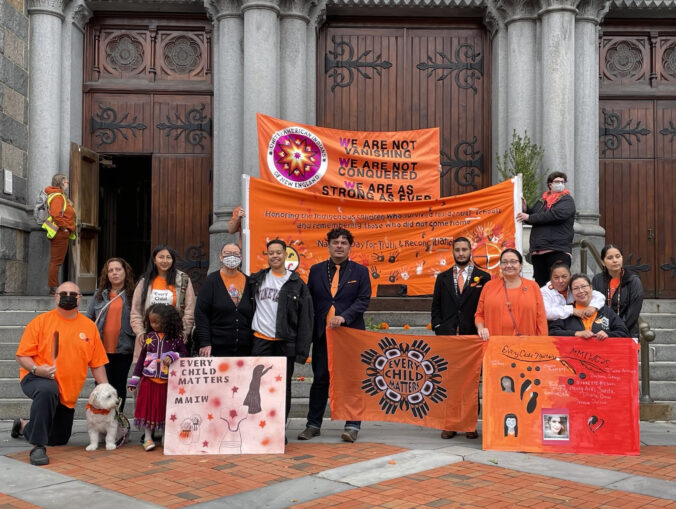Indigenous leaders, allies honor Orange Shirt Day
United American Indians of New England (UAINE), the North American Indian Center of Boston (NAICOB) and their allies took over the entrance of Boston’s Basilica Church Sept. 30 to commemorate the “National Day For Truth and Reconciliation” in so-called Canada.

Participants in Orange Shirt Day on the front steps of Basilica Church in Boston, Sept 30, 2023. (WW Photo: Mairead Skehan Gillis)
Commonly known as Orange Shirt Day, Sept. 30 commemorates the tens of thousands of Indigenous children kidnapped and imprisoned by Canadian settler authorities in residential “schools.” The U.S. government also operated a murderous system of boarding “schools,” where settler authorities forced kidnapped Native children to “assimilate” into white settler culture.
Phyllis Webstad, a Northern Secwepemc citizen of the Stswecem’c Xgat’tem First Nation and a residential school survivor, led efforts to establish Orange Shirt Day. Webstad tied the suffering and trauma of other Indigenous children to an experience she had as a 6-year-old child, when residential school staff stripped her of her clothing, including the orange shirt her grandmother had bought her for her first day.
Stressing the importance of Orange Shirt Day, Mahtowin Munro, co-leader of UAINE, said: “We are here to support our Indigenous family across Turtle Island who have suffered trauma as a result of residential schools that tens of thousands of Indigenous children were forced to attend. In truth, we should not call these institutions ‘schools.’ Schools should not have graveyards and be places of horror for generations of children.”
The Catholic Church ran many of these institutions where staff beat, abused and murdered Indigenous children. Canada’s Truth and Reconciliation Committee has estimated that at least 4,000 Indigenous children died at residential schools, but the real figure is likely much higher.
Searches continue for mass graves
In Canada and the U.S., searches continue for unmarked mass graves containing the remains of thousands of children killed at residential and boarding schools. In 2022, an investigation found evidence of a mass grave of 215 children at the site of Kamloops Residential School in British Columbia.
In June of this year, following a campaign led by relatives of five Native children killed at Carlisle Indian Industrial School in Pennsylvania, the U.S. Army agreed to exhume and return the childrens’ remains to their respective Tribal Nations. At least 189 children are buried in the cemetery of Carlisle Indian Industrial School, as well as several unidentified children buried in graves marked “unknown.”
The Department of the Interior has identified at least 400 Indian boarding schools in the U.S. and reported 500 deaths so far, although the department expects that the actual death toll could be in the tens of thousands.
Although Pope Francis apologized to Indigenous peoples last year for his church’s role in seizing Native children, Catholic organizations still refuse to release records for residential schools and have handed over no abusive nun or priest for prosecution.
As Munro and other speakers at the Sept. 30 rally emphasized, the genocidal destruction of Indigenous families and the kidnapping of their children is ongoing. In June, Indigenous-led activism pressured the U.S. Supreme Court to uphold the Indigenous Child Welfare Act (ICWA) in a major victory for Tribal Sovereignty. Even with the crucial protections ICWA provides, however, foster care authorities in both the U.S. and Canada continue to separate Indigenous children from their relatives.
Other Indigenous speakers, many of whom have relatives who survived residential schools, shared the trauma these experiences have caused and their struggle for survival against ongoing genocidal settler colonial genocide. Each speaker received an orange flower, which they laid on the steps of the church in memory of the Indigenous children imprisoned, abused and murdered in residential schools.
To close the action, Indigenous activists and allies took part in a ceremonial round dance that both honored the suffering and trauma caused by residential schools, and demonstrated Indigenous resilience and ongoing resistance to settler colonialism worldwide.

